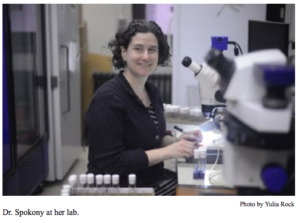Spokony is a Hands-On Researcher, Teacher of Genetics
 “When I was very little, my parents always took us to the American Museum of Natural History, the Bronx Zoo, and then even just watching on TV we would pick the shows that were about science.” That is how Dr. Rebecca Spokony traces back her interest in science.
“When I was very little, my parents always took us to the American Museum of Natural History, the Bronx Zoo, and then even just watching on TV we would pick the shows that were about science.” That is how Dr. Rebecca Spokony traces back her interest in science.
A native of Brooklyn Heights, New York City, she remembers how when her mother was an undergraduate, she worked on fruit flies. “Even though she did not go on to work on science after she graduated from college, it still was important to her, and she shared that with me, and I guess I incorporated that into who I was and still am now.”
Dr. Spokony went on to receive her bachelor’s in biology from Cornell University and her doctorate from the University of Arizona. Today she is an Assistant Professor of Natural Sciences at the Weissman School of Arts and Sciences at Baruch College, CUNY.
Spokony is now a very active geneticist, who uses fruit flies as her model organism. “One of the beautiful things about using fruit flies is that you can have all these tricks to manipulate the organism, and so anybody who’s creative can come up with some new method,” she says. “In the fruit fly community, we’re very lucky because most people are very nice, and they want to help each other, and actually if they create a new method or a new tool to manipulate the genetics, then they will be willing to share it with you.”
By studying fruit flies, Spokony can advance our general knowledge of how the human body works. “Hormones like estrogen might have an effect on a nuclear receptor. The nuclear receptor is a kind of protein that binds to hormones but then also can go into the nucleus of the cell and control the DNA. That’s why something like estrogen can have an effect in all different parts of the body. When you have drugs against estrogen, it can also have effects in different parts of the body. I’m studying in the flies how insect hormones are affecting different tissues all over the body.”
And there are great advantages to studying these hormones in fruit flies rather than in humans. “When studying humans, you’re usually just using cells that are separated from an organism in a dish, so you can’t ask how this is affecting all these different tissues at once, whereas with the flies I can look at different parts of the animal with the same stimulus or the same genetic background at the same time, as opposed to studying them in an artificial environment like a dish.”
Her studies relate to a new type of medical research that few have heard about, but that is becoming increasingly important. “One big push right now is the concept of precision medicine, tailoring your medical care to yourself. This is because the cost of sequencing DNA has gone down dramatically, and so you can get your whole DNA sequenced for about $1,000 or less. If you know every piece of DNA that you have, then you can say, ‘Okay, do I have the proteins that will be able to utilize certain drugs or not?’”
Spokony also is an innovative teacher, who teaches by taking a hands-on approach. “Doing it yourself,” she says, “is just a much better way to learn anything. I chose a research topic that is accessible, and anybody can do these experiments. I think you can get more done that way. Really the trick is you want to ask the good questions, but you want the technique to be straightforward and simple.”
She also encourages students to present at academic meetings. “I think that getting questions from people is incredibly important because that helps you to see what points you are getting across well, what questions are coming up, and also it can give you suggestions of what to do next.”
Geneticists usually get questions about genetic engineering and its possible downsides. “The general consensus these days is that it’s a great thing. When I was graduating from college it was the first time there was any cloning where you just took the whole DNA from one organism and then made another individual. It was a huge ethical issue, and that was without changing the DNA. Now, these days, this is also commercialized, so you can potentially clone your dog. The caveat is that it might take a lot to be successful, but this is much less controversial then it was 20 years ago,” she explains.
Spokony is now working on new exciting endeavors. “I just started on a project to look at how genetic variation between different flies will affect their sensitivity to a specific hormone. That project is based on the idea of how genetic variation affects individual sensitivity to different drugs. In this case, the hormone that I’m using is a hormone mimic that is used as a pesticide.”
“It acts like a juvenile hormone in insects. It keeps them in a juvenile stage,” she says. “The question is, will there be differences in natural population in the genotype that will make them more or less sensitive to the hormone? Some tissues don’t respond to the hormone at all, but some will show cell division, some will have cell death and some will have cell movement, so what is turning on in all of those tissues that can either help with curing a disease or potentially cause a disease? What other proteins are in those cells that are causing them to divide or to die?”
PDF Version:
Spokony is a Hands-On Researcher, Teacher of Genetics